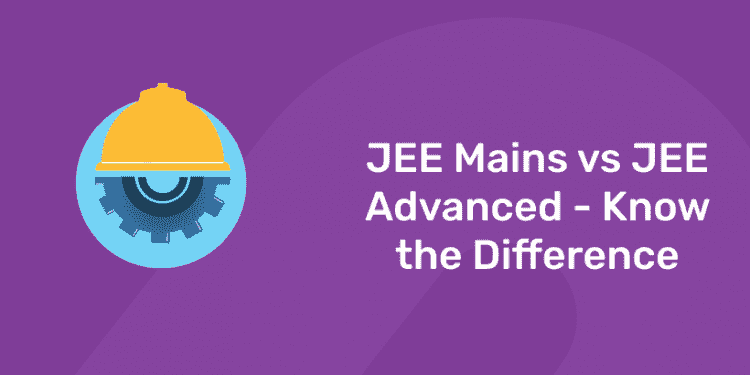Table of Contents
In this article, we will analyze the differences between JEE Mains and JEE Advanced, possibly the two most popular examinations in India. Knowing the differences can give you more insight into JEE and the Engineering career. Download the Entri App to help you prepare for these examinations. Read on to find out more about the differences between JEE Mains and JEE Advanced.
Ace your Preparation for Competitive Examination! Download Entri App!
JEE Mains vs JEE Advanced
In this segment, we will analyze the differences between JEE Mains and JEE Advanced. So, read on to find out more.
JEE Mains
In a nutshell, JEE Main is for those candidates who wish to get into BE or B. Tech courses in the National Institutes of Technology (NITs), Indian Institutes of Information Technology (IIITs), other Centrally Funded Technical Institutes (CFTIs) and engineering colleges of the participating states. The JEE Main is also the eligibility test that allows students to give the JEE Advanced exam which eventually leads to admission in either the IITs or the Indian School of Mines (ISM).
The JEE Main is comprised of two papers, namely, Paper 1 and Paper 2. The Paper 1 is for those who would want admission in BE and B. Tech courses and Paper 2 is for those who want admission in B.Arch. and B. Planning courses. While Paper 1 is held via the online and offline mode, Paper 2 is held only offline. While applying for the JEE Main exam, the candidates must specify if they want to appear for Paper 1 or Paper 2 or both.
Eligibility:
For JEE Main, there is no prescribed percentage to appear in the examination. But for admission to the NITs, IIITs & CFTIs, candidates must score minimum 75% marks (65% for SC/ST students) in the qualifying exam or must be in top 20 percentile in class 12th examination conducted by respective boards. Candidates, those passing in 12th exams in 2018 or 2019 are only eligible to apply for this exam.
Syllabus:
Syllabus of JEE Main comprises of the syllabus of CBSE class 11 and 12 Physics, Chemistry and Mathematics subjects. Topics like Electronic Devices, Electromagnetic Waves and Communication Systems are included in JEE main but are not asked in JEE Advanced. Similarly, some of the topics of Mathematics like Sets, Relations and Functions, Statistics and Probability, Trigonometry and Mathematical Reasoning are included in JEE Main but not in JEE Advanced. The exam conducting authority has laid down the complete Syllabus of JEE Main 2020.
Get Weekly Current Affairs on Entri App
JEE Advanced
JEE Advanced, on the other hand, is strictly paper-based. The candidates must sit for both Paper 1 and Paper 2 in this exam to get admission into engineering courses. For the candidates who wish to be admitted into architectural courses that IITs offer, the student must clear both Paper 1 and Paper 2 in the exam and then sit for the Architecture Aptitude Test (AAT) which seven zonal IITs conduct. The candidates must register online for AAT after clearing the JEE Advanced exam. The IITs don’t issue separate admit cards for the AAT exam, the students must take their JEE Advanced 2015 admit card along with them to the AAT exam center. If the students receive marks higher than the cut-off finalized by the Joint Implementation Committee will be granted the ‘Pass’ status. The final selection of the candidates is on the basis of the All India Rank obtained by them in the JEE Advanced exam since there is no separate ranking system for the AAT.
Eligibility:
Candidates can only qualify for JEE Advanced 2020 once they check out the result for JEE Main 2020 and secure a place among the top 2,50,000 rank holders.
Candidates appearing for class 12th in 2020 are eligible to appear in JEE Advanced 2020. However, if the examination Board of Class 12 declares the results for the academic year 2017-18 after June 2018, then the candidates of that board who appeared for their class XII exam in 2018 are also eligible to appear in JEE Advanced 2020, provided they meet the other eligibility criteria.
In case, the Examination Board of Class 12 declared the results for the academic year 2017-18 before June 2018 but the result of a particular candidate was withheld, then the candidate will not be eligible to appear in JEE Advanced 2020.
A candidate who has earlier been admitted in an IIT/ISM (irrespective of whether or not they continued in the program) OR accepted an IIT seat by reporting at a center in the past, are not eligible to apply. Candidates should have been born on or after October 1, 1995. Five years’ relaxation is given to SC, ST and PwD candidates, i.e. these candidates should have been born on or after October 1, 1990.
Syllabus:
Unlike JEE main, it includes few extra topics apart from class 12th syllabus. For e.g. JEE main does not include some of the topics of JEE Advanced like Thermal Physics is included in JEE Advanced but is not asked in JEE main. Similarly, Electrochemistry is included in JEE Advanced but not in JEE main
Attempt free Mock Tests for JEE Exam! Download App!
Conclusion
This article listed out the differences between JEE Mains and JEE Advanced. This will provide you with the necessary insight. Click here to view the Exam Date, Schedule, Eligibility and Syllabus of JEE Main. Download the Entri App today to gain access to various features like Online Classes, Video Lectures, Mock Tests and Quizzes along with Daily/Weekly Current Affairs. Do not be negligent about your Physical, Mental and Emotional health during the preparation period. This is the time to prepare. Good Luck.












